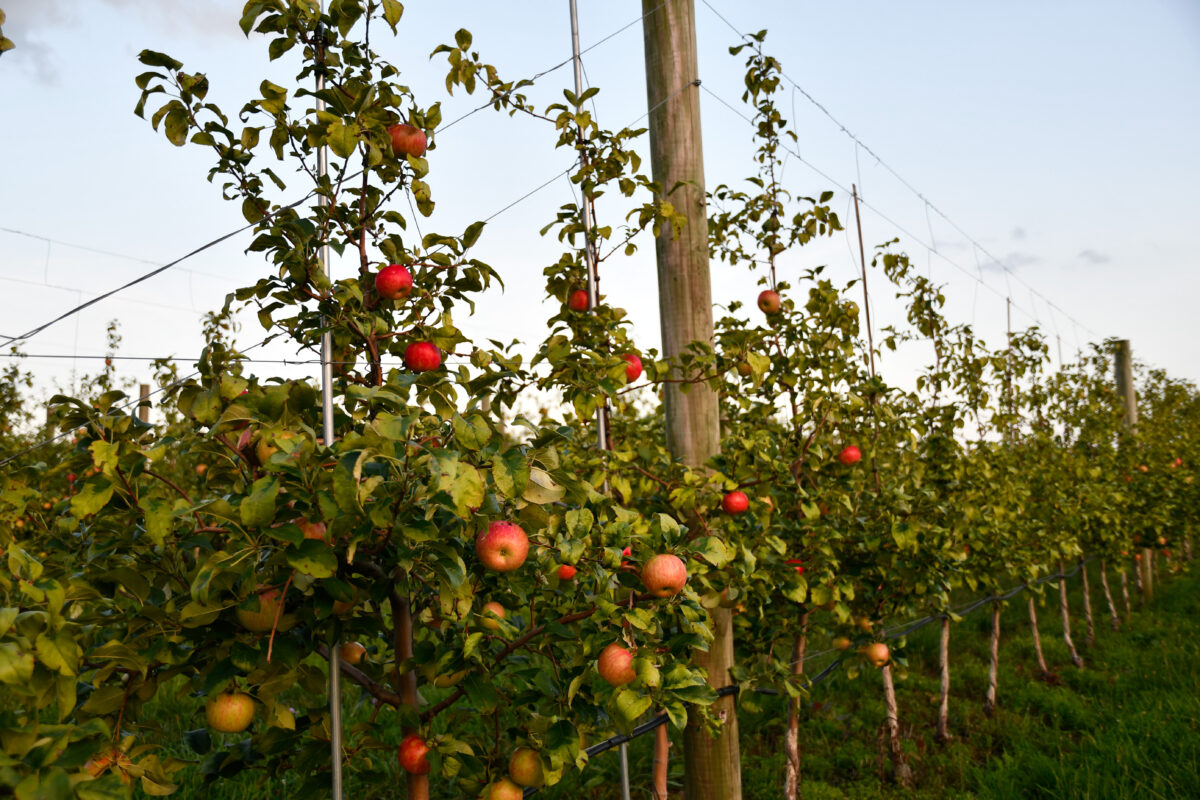Stained glass apple-tree branches fill the window in Mitch and Penny Lynd’s front door. Deep red apples glow with evening sunlight, and wavy green glass makes the leaves shimmer.
A wooden shelf just inside the 1980s ranch holds glass apples, wooden apples, and plastic apples. The mahogany-trimmed kitchen is complete with a honeycrisp tea kettle atop the electric stove.
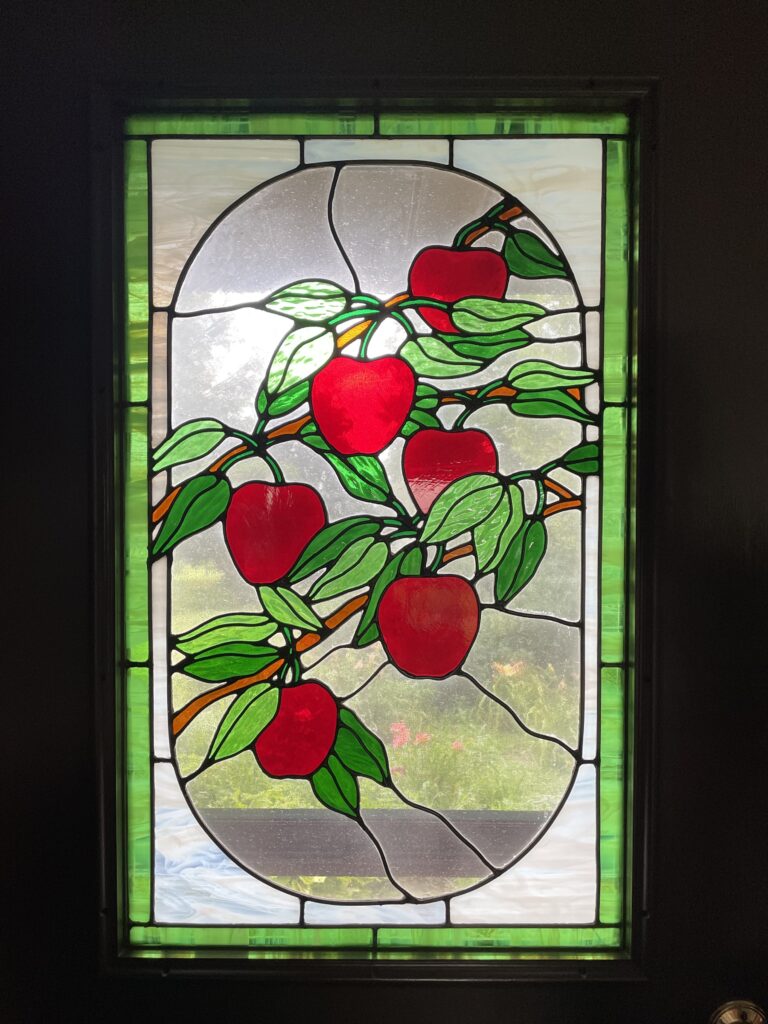
Even harder to miss is the vast orchard hugging the driveway and stretching far beyond the living room’s sliding doors. This makes up a fraction of Lynd Fruit farm, a century-old family business in Licking County that has become a household name across central Ohio.
It’s a beloved destination for city folks who want to spend a day in the country. Throughout the late Ohio summer and deep into autumn, families pick bouquets from fields of sunflowers, fill buckets with plump blackberries, and ride hay wagons between rows of apple trees.
Bree Phillips, a Columbus native, has loved the Lynd orchard for as long as she can remember.
“My mom and dad went there when they were younger, too, and my family has gone every year since I was little,” Phillips said. “I can’t wait to take my kids one day!”
Lynd Fruit Farm is a destination and a tradition in central Ohio, but these days, regulars worry about the future of this oasis. Lynd’s main orchard, at Morse Road and Rt. 310 between New Albany and Granville, sits just five miles east of where Intel plans to build a massive new computer-chip manufacturing campus. (Mitch and Penny Lynd’s home is in another Licking County orchard owned by the family.)
Intel anticipates employing 3,000 workers from across the country at the new campus in Jersey Township. And as many as 7,000 people will be working for years to build Intel infrastructure on at least 1,000 acres of former farmland.
And while Intel is bringing the largest industrial development project in Ohio history, it is far from the only company building warehouses and factories in the area.
Though this dramatic development is expected to move closer to the orchard in the next few years, Mitch Lynd, 79, is not terribly concerned.
“This kind of development has happened over and over again for 200 years, so I don’t think it’s quite as big a deal as the community does,” he said. “We’ve been through it before.”
With the Lynd family having spent more than a century in the Pataskala area, they’ve witnessed plenty of development, although not quite so much, so big, or so fast.
Change has become increasingly dramatic in recent years, as New Albany has expanded eastward with recent construction of large facilities for Google and Facebook along Beech Road between Rt. 161 and Morse Road.
Over the years, Lynd Fruit Farm has adapted with the changing landscape. The family has worked to preserve an idyllic rural experience for their customers.
“The experience at Lynd is laid back, first and foremost. It’s surrounded by cornfields!” Phillips said with a laugh. “It’s just a nice place to take a breath. A factory might be disruptive of that environment.”
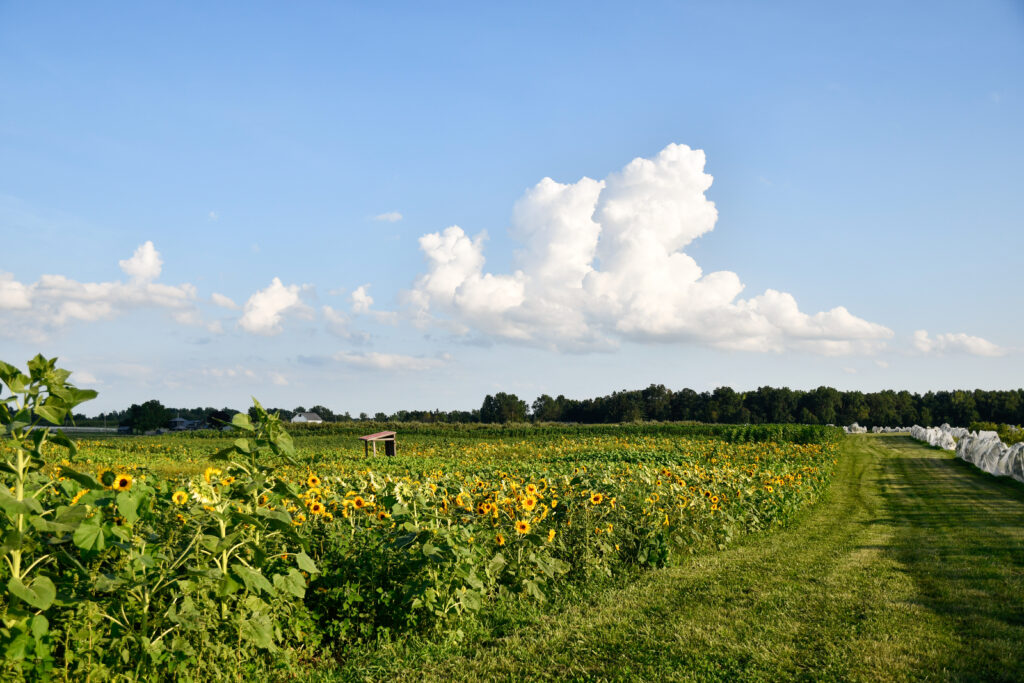
Though it’s not next door, Intel and all that comes with it will inevitably change the landscape around the Lynd’s farm. The roads will see more traffic as Intel employees become new residents of Licking County and commute past the corn mazes.
Mitch Lynd is retired now, but for his entire career, he ran the farm alongside his two brothers, Dave and Lester. With Mitch and Penny’s current house situated east of Johnstown atop the highest ridge in Licking County, they can see the family’s larger Morse Road orchard to the south across the valley.
These days, the Lynd family sells their fresh produce – blackberries, peaches, and more alongside the apples – through u-pick programs. For years, they sold strictly wholesale, carting truckloads of apples to grocery stores such as Kroger and hiring union guys to pick apples while they were on strike from their day jobs.
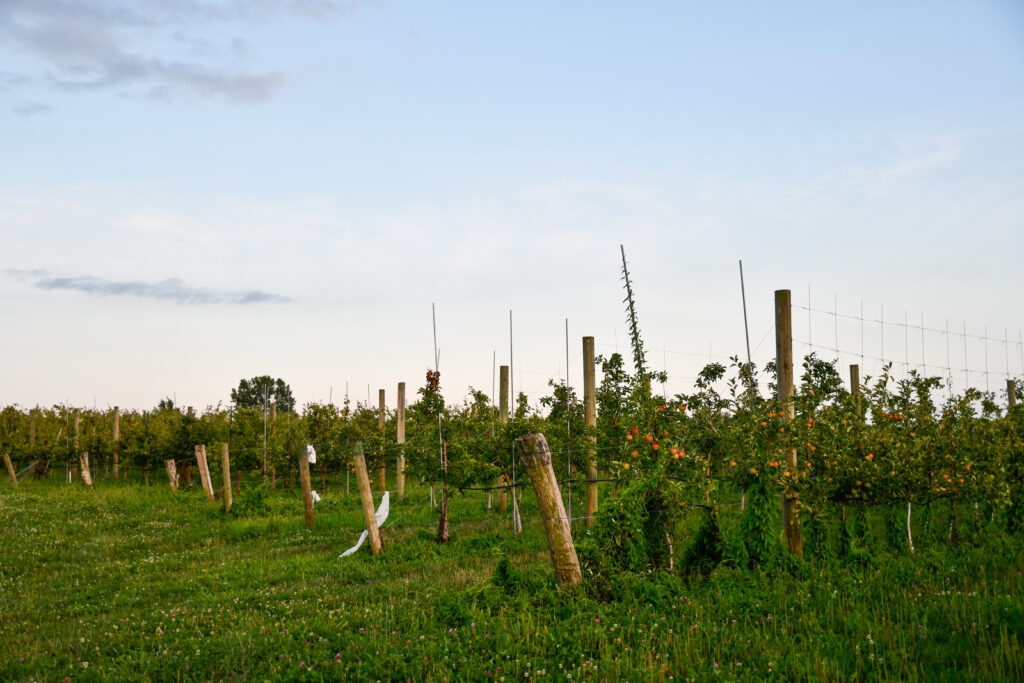
It became harder to find pickers to do the hot, piece-rate work, so one day, on a whim, they invited some family friends to pick for them.
“In my mind, apple picking is hard work – that’s how I’ve always viewed it,” Mitch said. “I was astonished at how much fun these kids had, and how much joy was on the parents’ faces, picking apples, eating apples, climbing trees, just having a big time. After they went home, I said to Penny, ‘Do you realize there’s a business to be had here?’”
His family thought he was crazy, but evidently, there was quite a business to be had there. At the peak of a beautiful autumn in Licking County, Lynd Fruit Farm draws thousands of customers to its apple orchards, corn mazes and wagon rides.
For many people, including Phillips, Lynd’s u-pick days are memorable even years later.
“I went [to Lynd] with my kindergarten class, and they had a mini apple orchard with small apple trees!” she said. “They gave us samples of apple juice and told us about how apple trees grow and how the bees help. Picking apples has always been my favorite part, along with the market!”
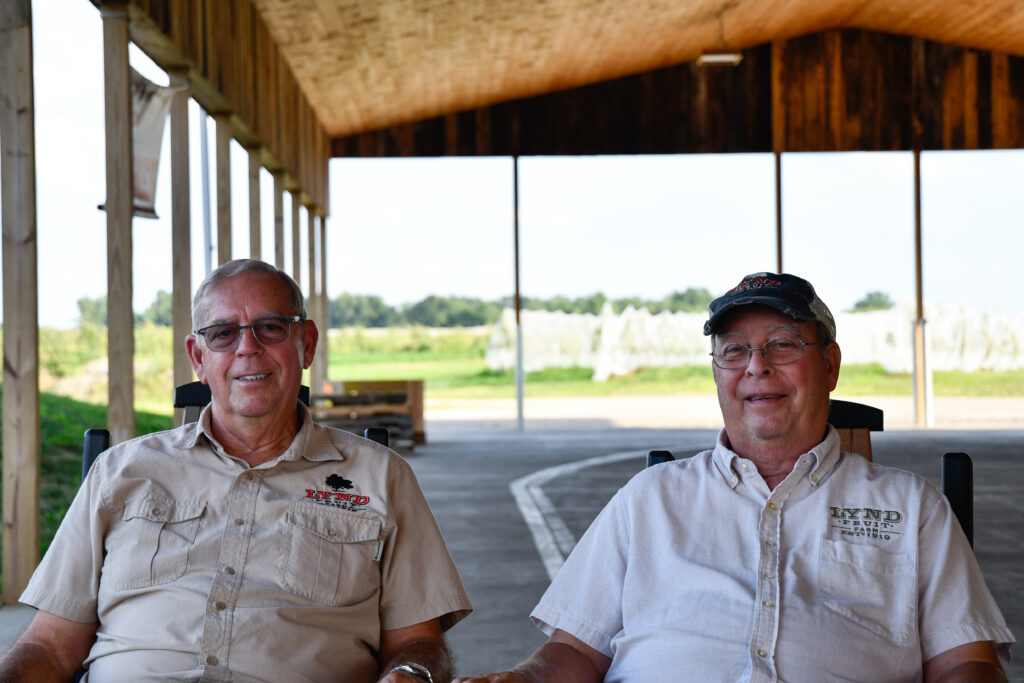
Alongside their thriving school tours and events, the Lynd family’s orchard is now punctuated with a large farm market at one corner of Morse Road and Rt. 310. What began as a table full of peaches under a maple tree soon gained a tent, and over the years, the canvas grew so large that the annual cost was about as much as putting up a permanent building. Losing the tent, however, worried Mitch’s brother Dave.
“I argued they were crazy to get rid of the tent, because everybody used to talk about going to the tent. The only thing that made us different from Kroger’s was the tent!” Dave said.
Years later, the market is a roaring success, selling everything from their own fruit to Amish-grown produce, to locally made lip balm, puzzles, handcrafted woodwork, their sweet, apple-cider slushies.
Moving away from the wholesale business was a pivotal decision for Lynd’s, and that move likely will be even more meaningful to urban dwellers as the orchard’s surroundings are developed.
Apple farming isn’t easy work, but the family shares an incredibly strong love for it. After decades of long days and many hard seasons, Dave, Mitch, and Mitch’s wife, Penny, are all formally retired.
They all tried to stay away from the orchard in retirement, but Dave and Penny both admit to showing up on the farm nearly every day in the summer. Dave typically drives to auctions to buy produce to sell at their market, and Penny runs the market with her daughter.
Holding a big pile of financial papers at their kitchen, Penny laughed when she noted that “Mitch is much better at retirement than I am.”
Still, the brother who has been retired longest has horticulture books lining his shelves and can’t help but ask customers to touch the velvetleaf growing between the sunflowers, if only to laugh at its aptly named texture. Walking carefully on rocky ground these days, he insistently makes his way through rows of apple trees to inspect each branch.
“You get old, and if you’re lucky, you loved doing what you did. Why would I do anything different if I like what I do?” Mitch said.
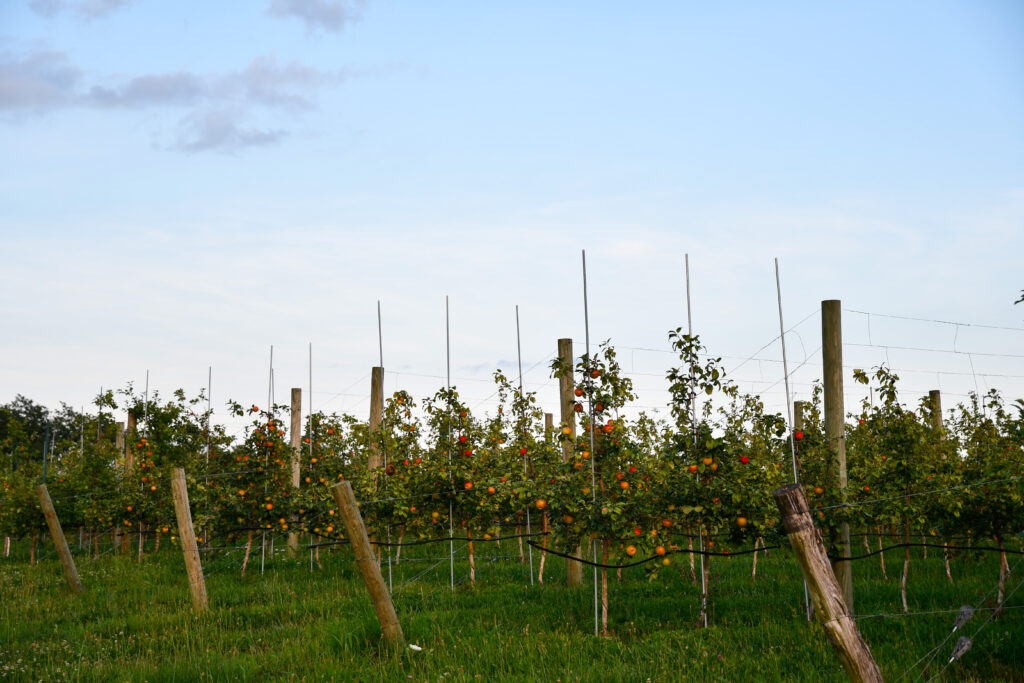
A business like this isn’t just a business; it’s blood. Mitch, Penny, and their two children lived in the Morse Road orchard for years, with doors open and company flowing through the farmhouse on a daily basis.
Eight of the 10 grandchildren live down the road from their grandparents’ new home on the ridge, close enough that Penny can tell that her granddaughter walked to her house just from the heat of her arm in a hug. Sweet Lynd peaches and ice cream are a staple in the summer, and no one leaves without having a bowl.
Lynd Fruit Farm appears timeless and enduring, even as development sweeps east from Columbus deeper into Licking County. For now, the farm preserves green space and gives city folks a sweet taste of life in the country.
Sophie LeMay writes for TheReportingProject.org, the nonprofit news organization of Denison University’s Journalism Program funded in part by the Mellon Foundation.

